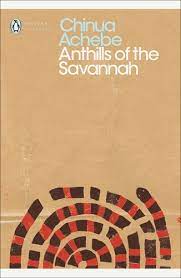Description
He needed to hear Africa speak for itself after a lifetime of hearing Africa spoken about by others Electrifying essays on the history, complexity, diversity of a continent, from the father of modern African literature.
He needed to hear Africa speak for itself after a lifetime of hearing Africa spoken about by others Electrifying essays on the history, complexity, diversity of a continent, from the father of modern African literature.
He needed to hear Africa speak for itself after a lifetime of hearing Africa spoken about by others Electrifying essays on the history, complexity, diversity of a continent, from the father of modern African literature.
| Author | ACHEBE, CHINUA |
|---|
You must be logged in to post a review.
When Sheila Ward went off to RADA to train as an actress in the early 1950s, she had no idea of the stormy path her life would take. After a short career as an actress in rep, with all the joys of juggling different roles and the comic possibilities of living in grim digs on very little money, she met and married a tea planter, and went off to live in Africa.
Through Sheila’s diaries, life in Africa springs into sharp relief as she learns to live with snakes, bugs and the recalcitrant servants. Sheila and her husband have four children and gradually adapt to a very different way of life. She meets the author Gerald Durrell, and Joy and George Adamson of Elsa the lioness fame, entertains fellow ex-pats and learns to love the unique terrain of Kenya’s hills.
Based on thirty years in the global oil game, intimate knowledge of African history and direct experience of over forty countries, this comprehensive book shows that Africa’s flaws are not the whole story, when it comes to the continent’s history. A definitive yet original account of the rush for Africa’s oil, this is also a guide to the hidden face of Africa. Duncan Clarke begins by placing African oil issues in their historical context before tackling the issues of power, nationalism and different parties’ strategies for control that have led to today’s oil scene. This book is the ultimate reference work on oil in Africa – which is vital to everyone’s future around the world.
Late one night in July, 1963, a South African police unit surrounded the African National Congress headquarters in Rivonia and arrested a group of Movement leaders gathered inside. Eventually eight of them, including Nelson Mandela, who was already serving a sentence, Walter Sisulu, Dennis Goldberg, Govan Mbeki, Raymond Mhlaba, Elias Motsoledi, Andrew Mangeni, and Ahmed Kathrada, were convicted of sabotage and, on June 12, 1964, sentenced to life in prison. Soon, these men became widely known as the “Rivonia Trialists.” Despite their imprisonment, the Trialists played active roles in the struggle against South Africa’s racist regime. Instead of being forgotten, as apartheid officials had hoped, they became enduring symbols in a struggle against injustice and racism.
Kathrada and his colleagues were classified as high security prisoners, segregated from others and closely watched. Every activity was regulated and monitored. Among the many indignities visited upon them, the prisoners were prohibited from keeping copies of incoming and outgoing correspondence. Kathrada, or “Kathy” as he is known, successfully hid both.
Letters From Robben Island contains a selection of 86 of the more than 900 pieces of correspondence Ahmed Kathrada wrote during his 26 years on Robben Island and at Pollsmoor Prison. Some were smuggled out by friends; others were written in code to hide meaning and content from prison censors. These are among his most poignant, touching, and eloquent communications. They are testimonies to Kathrada, his colleagues, and to their commitment to obtaining human dignity and freedom for all South Africans.
Trends in institutional partnership in higher education have shown tremendous growth in the past three decades. These trends are manifested through the growing initiatives of joint programs that promote collaborative research, academic mobility, joint curriculum development and course delivery, joint bidding for development projects and bench marking. Partnerships in higher education have been used not only as an instrument for institutional development through a wide range of strategic alliances but also as an essential way of introducing new voices to the operations of the universities by initiating new paradigms that bring new perspectives and bear competitive advantage on the partners. As the trend of partnership in higher education grew, scholars in higher education studies have also engaged in conceptualising higher education partnership from academic perspectives, analysing trends and developing models of higher education collaborations.
Select at least 2 products
to compare


Reviews
There are no reviews yet.